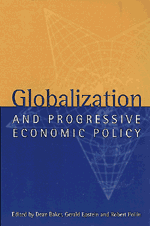Book contents
- Frontmatter
- Contents
- List of figures
- List of tables
- List of contributors
- Editors' acknowledgments
- 1 Introduction
- I The IMF, the World Bank, and neo-liberalism
- II Foreign direct investment, globalization, and neo-liberalism
- III Globalization of finance
- 6 Implications of globalization for macroeconomic theory and policy in developing countries
- Comment by Robert Blecker
- 7 Asia and the crisis of financial globalization
- Comment by Sule Ozler
- 8 Globalization and financial systems: policies for the new environment
- Comment by Ilene Grabel
- 9 Housing finance in the age of globalization: from social housing to life-cycle risk
- Comment by Jane D'Arista
- IV Trade, wages and the environment: North and South
- V Migration of people in a global economy
- VI Globalization and macroeconomic policy
- Bibliography
- Index
8 - Globalization and financial systems: policies for the new environment
Published online by Cambridge University Press: 04 August 2010
- Frontmatter
- Contents
- List of figures
- List of tables
- List of contributors
- Editors' acknowledgments
- 1 Introduction
- I The IMF, the World Bank, and neo-liberalism
- II Foreign direct investment, globalization, and neo-liberalism
- III Globalization of finance
- 6 Implications of globalization for macroeconomic theory and policy in developing countries
- Comment by Robert Blecker
- 7 Asia and the crisis of financial globalization
- Comment by Sule Ozler
- 8 Globalization and financial systems: policies for the new environment
- Comment by Ilene Grabel
- 9 Housing finance in the age of globalization: from social housing to life-cycle risk
- Comment by Jane D'Arista
- IV Trade, wages and the environment: North and South
- V Migration of people in a global economy
- VI Globalization and macroeconomic policy
- Bibliography
- Index
Summary
Introduction
This chapter examines the process of financial market globalization and its relationship to financial systems and monetary and financial policy. It focuses on the financial systems of Germany, France, Japan, the U.S., and the U.K. These financial systems have been categorized as being either (1) capital market-based, Anglo-Saxon, or exit-dominated systems (U.S. and U.K.) or (2) bank-based or voice-dominated systems (France, Germany, and Japan). Here, following Pollin (1995), these systems will be referred to as either exit-dominated or voice-dominated systems. It has previously been claimed that, as globalization of financial markets proceeds, a convergence will occur toward the exit-dominated model. This chapter highlights findings regarding the convergence of these financial systems along the dimensions of patterns of sources and uses of funds. It then discusses the monetary and financial policy implications of these results, and proposes policy alternatives to reduce the tendency toward speculative finance and increase the amount and stability of productive investment. These are policies designed for stability in light of the observed globalization trend and its implications.
The convergence of voice systems toward the exit model in the area of credit allocation and monetary policy has been substantial in recent years. Countries with voice-dominated systems have made their central banks use increasingly similar instruments of monetary policy in more liberalized and speculative financial environments.
In the past, monetary authorities often conducted monetary policy by directly controlling either the price or the quantity of credit or both.
- Type
- Chapter
- Information
- Globalization and Progressive Economic Policy , pp. 195 - 214Publisher: Cambridge University PressPrint publication year: 1998
- 2
- Cited by

